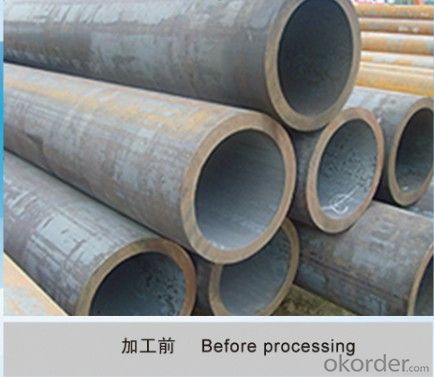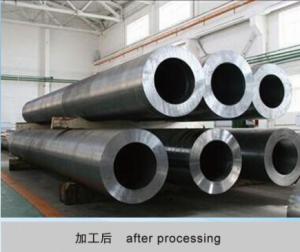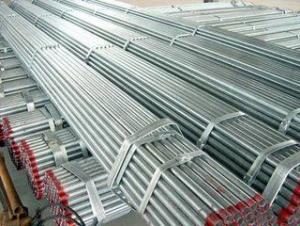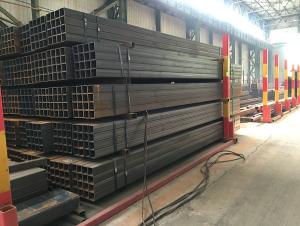Medium Thikcness Pipe for Machining
- Loading Port:
- China Main Port
- Payment Terms:
- TT or LC
- Min Order Qty:
- 25-35 m.t.
- Supply Capability:
- 1500T m.t./month
OKorder Service Pledge
OKorder Financial Service
You Might Also Like
Product Description:
1. Commodity Name: Seamless steel pipe
2. Standard: API,GB,ASTM,ASME,DIN
3. Quality grade: 10#, 20#, A106B, A53B,Q235, Q345, ST37-2, ST 45, ST52.etc.
4. Dimension:
OD: 1/2"-24"
WT: 8-80mm,
length: 5.8m,6m,8m,9m,12m
5. Technique: Hot Rolled/Cold Rolled/ Cold Drawn
6.Application
Main standards of medium thickness pipe for machining are API5L,JIS G3441/3444/3445,GB8162,the pipes are applied into tubular machinery parts processing.
7. Payment Terms: L/C , T/T
8.Packing and shipment
As per customers' requirements, it can also bepackagesd as beveled ends, typed marking, black painting, plastic caps protection,woven bags packing; Hexagonal package.
For 20" container the max length is 5.8m; For 40" container the max length is 11.8m. Other options are available based on customer requests. Please discuss when placing orders.
FAQ of Seamless Pipe :
①How is the quality of your products?
Our products are manufactured strictly according to national and internaional standard, and we take a test on every pipe before delivered out. If you want see our quality certifications and all kinds of testing report, please just ask us for it.
Guaranteed: If products’ quality don’t accord to discription as we give or the promise before you place order, we promise 100% refund.
②How about price?
Yes, we are factory and be able to give you lowest price below market one, and we have a policy that “ for saving time and absolutely honest business attitude, we quote as lowest as possible for any customer, and discount can be given according to quantity”,if you like bargain and factory price is not low enough as you think, just don’t waste your time.Please trust the quotation we would give you, it is professional one.
③Why should you chose us?
Chose happens because of quality, then price, We can give you both.Additionally, we can also offer professional products inquiry, products knowledge train(for agents), smooth goods delivery, exellent customer solution proposals.Our service formula: good quality+good price+good service=customer’s trust
SGS test is available, customer inspection before shipping is welcome, third party inspection is no problem.
Seamless Pipe Images:

- Q: Can steel pipes be used for oil and gas well production?
- Yes, steel pipes are commonly used for oil and gas well production due to their high strength, durability, and resistance to corrosion.
- Q: What is the difference between steel pipes and PVC-M pipes?
- Steel pipes are made of a strong and durable metal, while PVC-M pipes are made of a thermoplastic material known as polyvinyl chloride modified. The main difference lies in their composition and characteristics. Steel pipes are typically heavier and more robust, offering greater strength and resistance to high pressure and temperature. On the other hand, PVC-M pipes are lightweight, flexible, and corrosion-resistant, making them ideal for applications where chemical resistance and ease of installation are crucial factors.
- Q: How are steel pipes used in the defense sector?
- Steel pipes are used in the defense sector for various purposes such as constructing military infrastructure, including bunkers, underground facilities, and missile silos. They are also utilized in the manufacturing of military vehicles, weapons systems, and equipment. Steel pipes provide strength, durability, and resistance to extreme conditions, making them ideal for applications in the defense sector.
- Q: How are steel pipes cleaned and maintained?
- Steel pipes are cleaned and maintained through various methods. The process typically involves removing any debris or rust from the pipes using wire brushes or sandblasting. After cleaning, a protective coating is applied to prevent corrosion. Regular inspections and maintenance checks are also conducted to identify any potential issues such as leaks or weak points, ensuring the pipes remain in optimal condition.
- Q: What are the factors that affect the lifespan of steel pipes in different environments?
- The factors that affect the lifespan of steel pipes in different environments include the pH level of the surrounding soil or water, presence of corrosive chemicals, humidity and moisture levels, exposure to extreme temperatures, mechanical stress or pressure, and the quality of protective coatings or corrosion inhibitors applied to the pipes.
- Q: How are steel pipes insulated for thermal purposes?
- Steel pipes are commonly insulated for thermal purposes using a variety of methods. One of the most common methods is to wrap the pipes with insulation material such as fiberglass, mineral wool, or foam. This insulation material acts as a barrier between the pipe and the surrounding environment, preventing heat transfer or loss. To properly insulate steel pipes, the insulation material is typically wrapped tightly around the pipe, ensuring that there are no gaps or openings for heat to escape. The insulation is then secured in place using adhesive tapes or metal bands. In addition to external insulation, pipes can also be internally insulated. This involves placing insulation material inside the pipe, creating a layer of protection against heat loss or gain. Internal insulation is commonly used in applications where the pipe carries hot fluids or gases. Furthermore, some steel pipes are designed with a built-in insulation layer. These pipes, known as pre-insulated pipes, have insulation material already integrated into the pipe structure. The insulation layer is typically made of foam or mineral wool and is covered with a protective outer layer, providing effective thermal insulation. Insulating steel pipes for thermal purposes is crucial in various industries, such as oil and gas, HVAC, and plumbing. Proper insulation helps to maintain the desired temperature of the fluid or gas flowing through the pipes, preventing energy loss and improving overall efficiency.
- Q: Can steel pipes be used for drinking water supply?
- Yes, steel pipes can be used for drinking water supply. However, it is important to ensure that the pipes are properly coated or lined to prevent corrosion and any potential contamination of the water. Regular maintenance and monitoring are also necessary to ensure the pipes remain in good condition for safe drinking water supply.
- Q: Can steel pipes be used for conveying slurry?
- Yes, steel pipes can be used for conveying slurry. Steel pipes are commonly used in industries such as mining, dredging, and wastewater treatment, where slurry - a mixture of solid particles and liquid - needs to be transported. Steel pipes offer high strength, durability, and resistance to abrasion, making them suitable for handling the abrasive nature of slurry. Additionally, steel pipes can be lined or coated with materials such as rubber or ceramic to further enhance their resistance to wear and corrosion, making them a reliable choice for conveying slurry.
- Q: How do steel pipes perform in earthquake-prone regions?
- Steel pipes perform well in earthquake-prone regions due to their high strength, durability, and flexibility. The inherent properties of steel, such as its ability to absorb energy and distribute stress, make steel pipes resistant to seismic activity. Additionally, steel pipes can be designed and installed with specific measures to further enhance their seismic performance, ensuring the safety and reliability of infrastructure in earthquake-prone areas.
- Q: What are the different types of steel pipe elbows?
- There are several different types of steel pipe elbows that are commonly used in various industries and applications. These types include: 1. 90-degree elbows: These elbows have a sharp 90-degree bend and are commonly used when a change in direction is required to redirect the flow of fluid or gas. They are widely used in plumbing, construction, and industrial piping systems. 2. 45-degree elbows: Similar to 90-degree elbows, 45-degree elbows also provide a change in direction but with a smaller angle. They are often used in situations where a more gradual change in flow direction is required. 3. Long radius elbows: Long radius elbows have a larger radius of curvature compared to standard elbows. This design helps to reduce fluid friction and pressure drop, making them suitable for applications that require smoother flow, such as in high-flow systems or those involving viscous fluids. 4. Short radius elbows: In contrast to long radius elbows, short radius elbows have a smaller radius of curvature. They are generally used in tight spaces where a compact design is required, but they can cause higher pressure drops due to increased fluid friction. 5. Reducing elbows: These elbows are used when there is a need to connect pipes of different diameters. They have one end with a larger diameter and the other end with a smaller diameter, allowing for a smooth transition between two pipes of different sizes. 6. Mitered elbows: Mitered elbows are custom-made elbows that are fabricated by cutting and welding multiple sections of pipe at specific angles. They are often used in situations where standard elbows cannot accommodate the required angle or when a unique design is needed. Overall, the selection of the appropriate type of steel pipe elbow depends on factors such as the application, fluid flow requirements, space constraints, and compatibility with the piping system.
Send your message to us
Medium Thikcness Pipe for Machining
- Loading Port:
- China Main Port
- Payment Terms:
- TT or LC
- Min Order Qty:
- 25-35 m.t.
- Supply Capability:
- 1500T m.t./month
OKorder Service Pledge
OKorder Financial Service
Similar products
Hot products
Hot Searches
Related keywords





















